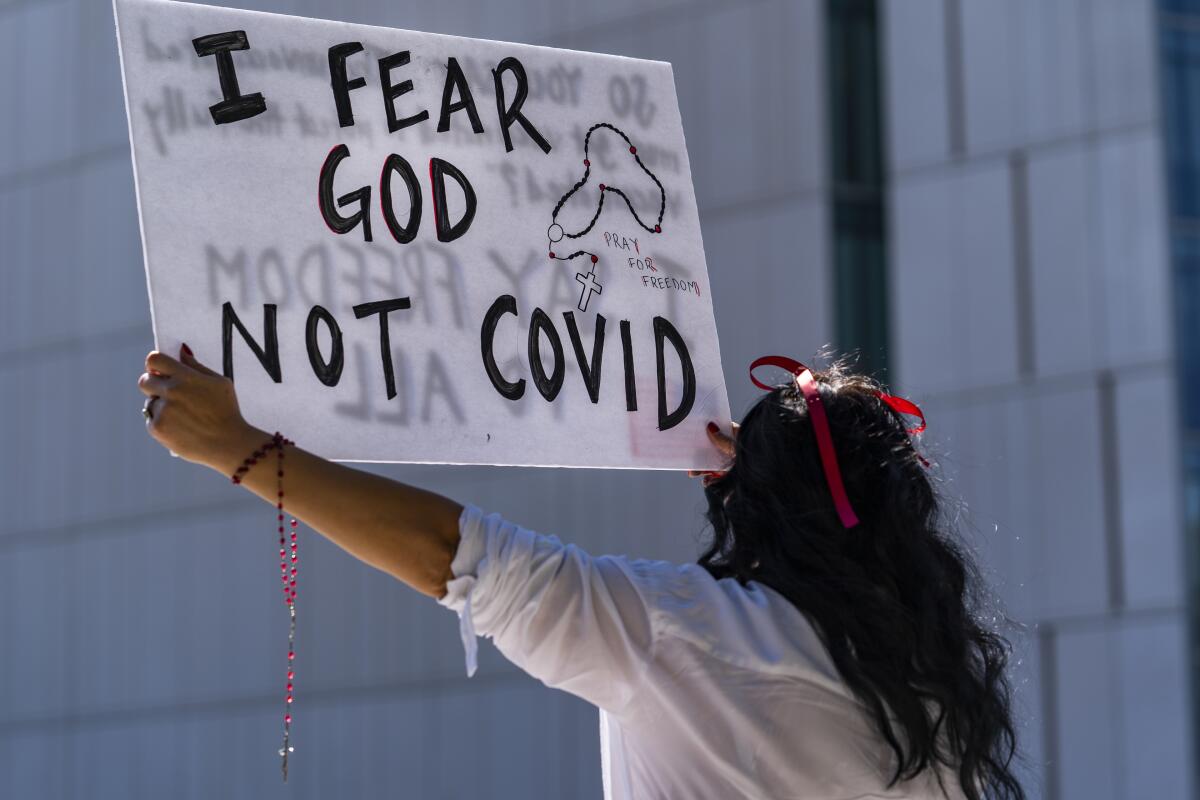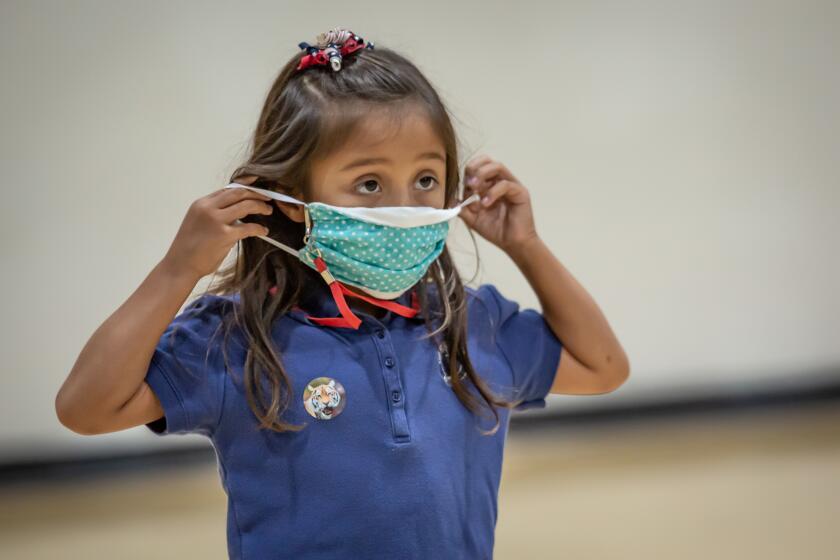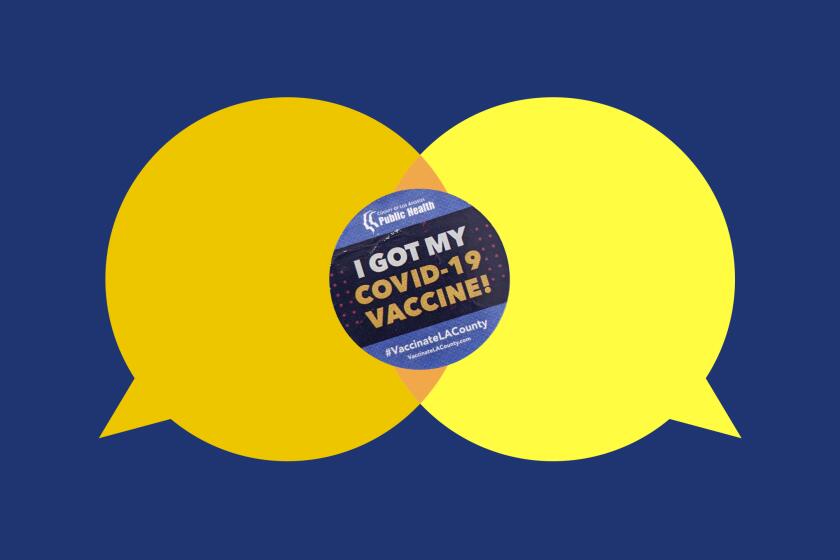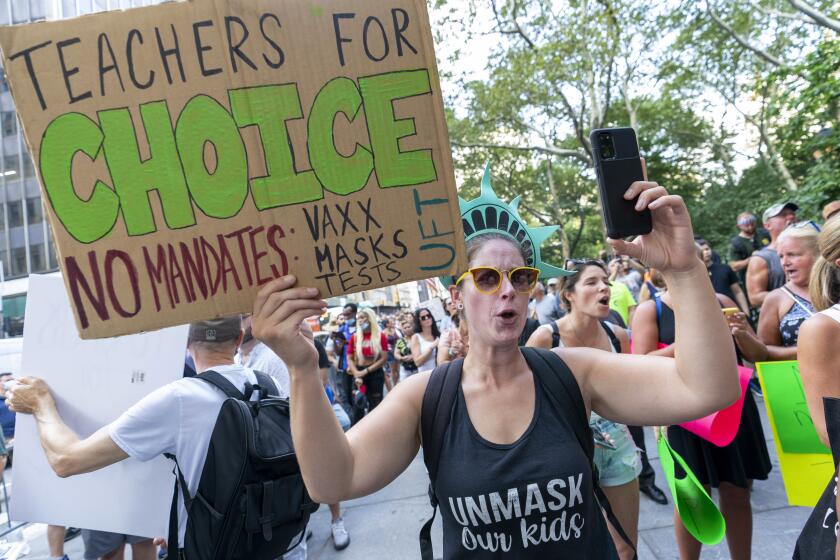Citing religious beliefs to avoid the COVID-19 vaccine could cost you your job

As more employers require their workers to get vaccinated against COVID-19, more workers are finding religion. Or rather, âsincerely held religious beliefsâ that, they say, prevent them from getting the shots.
Hundreds of Los Angeles firefighters have sought exemptions from the cityâs vaccine mandate for religious or medical reasons, and thousands of Los Angeles Police Department employees are expected to do the same. And they may be the leading edge of the wave of workers seeking exemptions, as the federal government is preparing to require employers with 100 or more workers to order vaccinations or weekly coronavirus testing for all employees. Federal employees are already required to be vaccinated even if they work from home, with no testing alternative, and a similar requirement is being developed for federal contractors and subcontractors.
Nicholas De Blouw, an employment attorney and partner at Blumenthal Nordrehaug Bhowmik De Blouw in Los Angeles, said heâs getting calls âevery single dayâ from people facing a vaccine mandate â including three in about 20 minutes on Wednesday morning.
But what are the rules surrounding religious exemptions? What constitutes a âsincerely heldâ belief? And how much leeway do employers have when faced with a torrent of exemption claims based on religion? The Times talked to experts in employment law and religious rights, and here are their answers to these and other questions.
What is the legal landscape?
The Supreme Court upheld the constitutionality of vaccine mandates more than 100 years ago, but has made it clear that employers canât run roughshod over their workersâ religious beliefs. The protections for religious objectors are in California law, the U.S. Constitution and federal law, particularly Title VII of the Civil Rights Act of 1964, which requires private companies to make âreasonable accommodationsâ for workers who have âsincerely heldâ religious beliefs that conflict with vaccination.
Employers hoping to stand on firm legal footing need to look at each employeeâs request and go through an interactive process with the employee to seek a reasonable accommodation for sincerely held beliefs.
âThat process is really key,â said Mark Phillips, a partner at the Reed Smith law firm in Los Angeles. Employers canât dismiss a request for a religious exemption out of hand, âeven if it may initially seem ridiculous,â Phillips said. The employer has to engage with the worker ânot only to find out the nature of the request, but also to find out if accommodation is possible and reasonable.â
About half of LAFD firefighters and LAPD officers refuse to vaccinate, for religious or political reasons, and are endangering the people they serve.
What sorts of beliefs might qualify?
Angel James Horacek, an attorney in Culver City, said Californiaâs ban on âreligious creedâ discrimination applies not just to beliefs based on an organized religionâs teachings, but also to âbeliefs, observances, or practices, which an individual sincerely holds and which occupy in his or her life a place of importance parallel to that of traditionally recognized religions.â
Thereâs still a limit to what constitutes a religion, Horacek said in an email. In a 2002 decision holding that veganism was not a religious belief, a California appeals court laid out three factors: a religion addresses âfundamental and ultimate questions,â consists of âa belief-system as opposed to an isolated teaching,â and âoften can be recognized by the presence of certain formal and external signs.â
Employers can ask for the details of the religious conviction behind the request for an accommodation and explore whether the objection is based on politics, ideology or medical concerns. And if the employer denies the request and the worker sues, the burden will be on the worker to establish that he or she was motivated by a sincere religious belief.
Nevertheless, said Phillips, âitâs not a good idea to question the sincerity of somebodyâs religious belief.â Horacek agreed, saying thereâs very little an employer can do to test whether a workerâs claim is sincere.
Nor does it matter whether the person is following the teaching of his or her faith â leaders of the vast majority of organized religions have endorsed at least some of the COVID-19 vaccines that are available. âYou donât go by what their organized religion believes,â Phillips said. âAn individualâs personal religious conviction can differ from their organized religion.â
Added Douglas Laycock, Robert E. Scott distinguished professor of law at the University of Virginia, âCourts are in no position to adjudicate the official teaching of the church anyway. There are lots of issues on which members of a church disagree, and lots of cases in which the objector takes the teaching further than the church does.â
When can parents expect their kids to be eligible for a COVID vaccine? Hereâs the latest.
What is a âreasonable accommodationâ?
The issue here is what it would take to minimize the risk posed by an unvaccinated employee. Could the person work from home, or do the job in a private office, or otherwise maintain minimal contact with other workers and the public? Is there another, similar job that the person could do remotely?
For private employers, the accommodation isnât âreasonableâ if it imposes an undue financial or operational burden on the company. Thatâs an ill-defined standard, so the answer will depend on such things as the nature of the accommodation and the size of the company.
Itâs important to bear in mind that if your employer mandates COVID-19 vaccinations, your religious objection, no matter how sincerely held, is no guarantee that you can keep your job. The employer is obligated to try to find a way to keep you at work unvaccinated, but whether thatâs possible depends on what you do.
For example, if you canât work from home, canât socially distance from co-workers or customers, and canât be tested frequently enough to assure the safety of those you come into contact with, your employer may have reason to replace you. âIf you canât perform the essential functions of the job even with accommodation, then thereâs no accommodation thatâs going to help you,â Phillips said.
Two other factors are the extent to which workers interact with co-workers and the public and the nature of those interactions, he said. Another is the rate of coronavirus transmission among people in that workforce â the higher the rate, the greater the argument against an exemption.
De Blouw noted that employers have a legal obligation to maintain a safe and healthy workplace. If they donât require vaccinations and an employee gets infected at work and dies, De Blouw said, they could be held liable.
You want them to get vaccinated. They donât. Now what? Tips from experts to have a conversation that could possibly change their mind.
What about the public interest?
Laycock, who described himself as âone of the strongest academic defenders of religious exemptions in the country,â nevertheless argues that Los Angeles officials would be on solid legal footing if they rejected all exemptions from the vaccine mandate except those needed for medical reasons.
âIt has a compelling government interest in requiring vaccination against a deadly infectious disease. The court cases are essentially unanimous about that,â he wrote in an email. âThe unvaccinated are overwhelming our hospitals and depriving other folks of needed medical care, and because no vaccine is 100% effective, they are spreading the disease to folks who are vaccinated, causing minor problems for many of them and killing a few of them.â
Other attorneys disagree, arguing that like any other employer, the city would have to meet individually with each of the hundreds of employees seeking exemptions to determine whether they could be reasonably accommodated.
In addition, the Biden administration has muddied the waters when it comes to what employers need to do to protect the public, mandating vaccinations for federal workers and contractors regardless of their size, but allowing a testing alternative for private employers with 100 or more workers, and requiring neither testing nor vaccinations for workers at other private companies.
No major religions denounce vaccination. That hasnât kept individual churches from providing religious âcoverâ for those seeking to avoid jabs.
More to Read
Sign up for Essential California
The most important California stories and recommendations in your inbox every morning.
You may occasionally receive promotional content from the Los Angeles Times.















